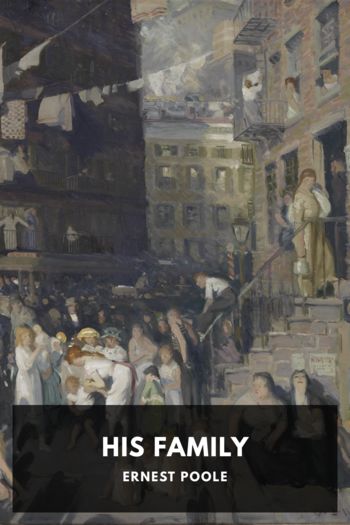His Family, Ernest Poole [best historical biographies txt] 📗

- Author: Ernest Poole
Book online «His Family, Ernest Poole [best historical biographies txt] 📗». Author Ernest Poole
He followed the herd into the barn. In two long rows, the great heads of the cattle turned hungrily, lowing and sniffing deep, breathing harshly, stamping, as the fodder cart came down the lines. What a splendidly wholesome work for a lad, growing up with his roots in the soil, in these massive simple forces of life. What of Edith’s other children? Would they be willing to stay here long? Each morning Roger breakfasted with Bruce the baby by his side. “What a thing for you, little lad,” he thought, “if you could live here all your days. But will you? Will you want to stay? Won’t you, too, get the fever, as I did, for the city?” In the joyous, shining, mysterious eyes of the baby he found no reply. He had many long talks with Betsy, who was eager to go away to school, and with Bob and little Tad who were going to school in the village that fall. And the feeling came to Roger that surely he would see these lives, at least for many years ahead. They were so familiar and so real, so fresh and filled with hopes and dreams. And he felt himself so a part of them all.
But one morning, climbing the steep upper field to a spring George wanted to show him, Roger suddenly swayed, turned faint. He caught hold of a boulder on the wall and held himself rigid, breathing hard. It passed, and he looked at his grandson. But George had noticed nothing. The boy had turned and his brown eyes were fixed on a fallow field below. Wistfully Roger watched his face. They both stood motionless for a long time.
As the summer drew slowly to a close, Roger spent many quiet hours alone by the copse of birches, where the glory of autumn was already stealing in and out among the tall slender stems of the trees. And he thought of the silent winter there, and of the spring which would come again, and the long fragrant summer. And he watched the glow on the mountains above and the rolling splendors of the clouds. At dusk he heard the voices of animals, birds and insects, murmuring up from all the broad valley, then gradually sinking to deep repose, many never to wake again. And the span of his life, from the boyhood which he could recall so vividly here among these children, seemed brief to him as a summer’s day, only a part of a mighty whole made up of the innumerable lives, the many generations, of his family, his own flesh and blood, come out of a past he could never know, and going on without him now, branching, dividing, widening out to what his eyes would never see.
Vaguely he pictured them groping their way, just as he himself had done. It seemed to Roger that all his days he had been only entering life, as some rich bewildering thicket like this copse of birches here, never getting very deep, never seeing very clearly, never understanding all. And so it had been with his children, and so it was with these children of Edith’s, and so it would be with those many others—always groping, blundering, starting—children, only children all. And yet what lives they were to lead, what joys and revelations and disasters would be theirs, in the strange remote world they would live in—“my flesh and blood that I never shall know.”
But the stars were quiet and serene. The meadows and the forests on the broad sweep of the mountain side took on still brighter, warmer hues. And there was no gloom in these long goodbyes.
On a frosty night in September, he left the farm to go to the city. From his seat in the small automobile Roger looked back at the pleasant old house with its brightly lighted windows, and then he turned to George by his side:
“We’re in good shape for the winter, son.”
But George did not get his full meaning.
At the little station, there were no other passengers. They walked the platform for some time. Then the train with a scream came around the curve. A quick grip on George’s hand, and Roger climbed into the car. Inside, a moment later, he looked out through the window. By a trainman with a lantern, George stood watching, smiling up, and he waved his hand as the train pulled out.
XXXIXThe next morning on his arrival in town, Roger went to his office. He had little cause for uneasiness there, for twice in the summer he had come down to keep an eye on the business, while John had taken brief vacations at a seaside place nearby. The boy had no color now in his cheeks; as always, they were a sallow gray with the skin drawn tight over high cheek bones; his vigor was all in his eyes. But here was a new John, nevertheless, a successful man of affairs. He had on a spruce new suit of brown, no cheap ready-made affair but one carefully fitted to conceal and soften his deformity. He was wearing a bright blue tie and a cornflower in his buttonhole, and his sandy hair was





Comments (0)